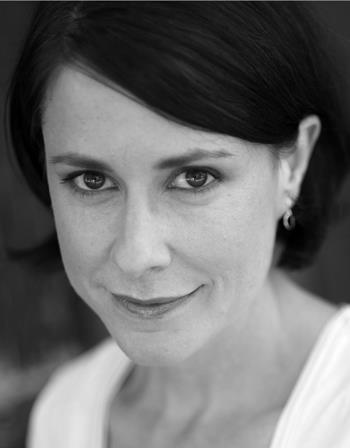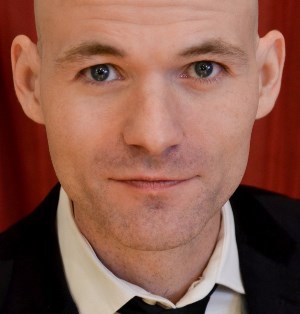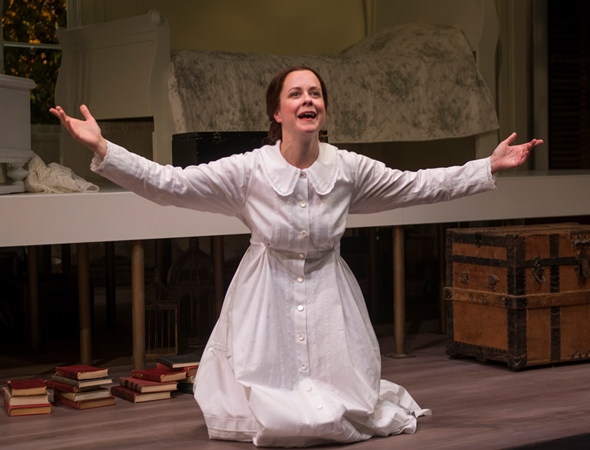Role Playing: Kate Fry’s vivid Emily Dickinson sprang from poet’s fine-tuned, evocative verse
Interview: Actress sees feminine feminist in the Emily Dickinson of William Luce’s one-woman play “Belle of Amherst” at Court Theatre.
By Lawrence B. Johnson
Volumes have been written about Emily Dickinson, but it was through the reclusive poet’s own words that Kate Fry found her way into the heart she illuminates in William Luce’s one-woman play “The Belle of Amherst” at Court Theatre.
“Emily Dickinson had Shakespeare’s love of language,” says Fry, whose subtly inflected portrait spans two hours and several thousand words. “I started with her poems about a year ago, anthologies of her words – not what others had written about her. In the poems, and in her letters, you get these clear images of what was speaking to her intellect on any given day, the things she felt compelled to put down on paper.”
 Dickinson (1830-86) lived her entire life in Amherst, Mass., where she grew up in well-provided circumstances, the daughter of a prominent political figure. She never married, progressively turning away from society and toward a life of relative isolation and creative observation. She developed a highly original poetic style at once cryptic and lyrical, incisive and evocative. Though her poetry never gained wide attention in her lifetime, when the first volumes were published in 1890, four years after her death, Dickinson won instant popularity.
Dickinson (1830-86) lived her entire life in Amherst, Mass., where she grew up in well-provided circumstances, the daughter of a prominent political figure. She never married, progressively turning away from society and toward a life of relative isolation and creative observation. She developed a highly original poetic style at once cryptic and lyrical, incisive and evocative. Though her poetry never gained wide attention in her lifetime, when the first volumes were published in 1890, four years after her death, Dickinson won instant popularity.
“The things she chose to think about, the way she wrote things down – it’s all so fascinating and incredibly refreshing,” says Fry. “When you spend time with her language, with her poetry, you find it typically goes small in order to go big. It might be a flower or a feeling that happened because of a glance that someone gave her. She turns the instant of that feeling into something much larger. It’s so cool.”
But did Dickinson view her own life as all that cool? Much ink has been spilled over whether she lived in serene separation – a bit like Henry David Thoreau, content to commune with the natural world and the minutiae of living – or suffered a bitter loneliness. Luce’s play suggests a woman at peace with her life, and Fry tends to agree.
 “We’ll never really know,” she says. “Before I got into the play, I imagined her as someone sad and cut off, and even now I’m sure life was not all happiness and ease for her. But I think we can see that she made her own choices and kept the company she wanted to keep. She had very intimate friends, and of course she loved writing. It’s a refreshing idea, not feeling the need to be out there projecting some particular persona.
“We’ll never really know,” she says. “Before I got into the play, I imagined her as someone sad and cut off, and even now I’m sure life was not all happiness and ease for her. But I think we can see that she made her own choices and kept the company she wanted to keep. She had very intimate friends, and of course she loved writing. It’s a refreshing idea, not feeling the need to be out there projecting some particular persona.
“And we all change. Our bodies change. Our circumstances change. I think Luce made a serious attempt to know her – through her letters and relationships, the people who loomed large in her life.”
Among the fetching aspects of Luce’s formidable monologue-as-portrait is the way Dickinson’s speech can modulate seamlessly from prose into poetry. Suddenly, what began as an ordinary observation is transmuted into magical lyricism, trenchant essence. Time and again, Fry makes that shift with disarming naturalism, sans so much as a deep breath’s fanfare.
“Her switching in and out of poetry is like Shakespeare,” the actress says. “Sometimes the shift to poetry (in mid-thought) signals a new urgency or depth. Sometimes she’s trying to clarify a point: ‘I’ll try this language.’ Or, ‘Now I’m going to tell you a poem I wrote about a train.’ As the play goes on, the lines between prose and poetry grow hazy. I’m sure Luce went for the effect on purpose as a means of expressing her character.”
 We meet that charming, down-home character as if we’d dropped in on her quite unexpectedly. You might say the play begins with a digression: It’s not the poet whom we first encounter, but rather Emily Dickinson the proud and happy baker. She’s stirring batter in a huge bowl to make a traditional “black cake,” the remarkable ingredients of which she recites at some length – but, Fry notes, not exactly as in the original text. Director Sean Graney had a different idea.
We meet that charming, down-home character as if we’d dropped in on her quite unexpectedly. You might say the play begins with a digression: It’s not the poet whom we first encounter, but rather Emily Dickinson the proud and happy baker. She’s stirring batter in a huge bowl to make a traditional “black cake,” the remarkable ingredients of which she recites at some length – but, Fry notes, not exactly as in the original text. Director Sean Graney had a different idea.
“In the script, she’s carrying the cake already made,” Fry explains. “Sean suggested making it instead. She used things that she baked or cooked or grew or cultivated as tokens of friendship. Even as she became more reclusive, she would gift someone with a flower and a poem or a piece of cake and a poem.
“It’s no coincidence that she brings up how much her father loved her baking. She kept doing it to please him, to stay connected to him – even though their relationship was not what we would call close.”
The baking underscores a side of Dickinson that Fry says played a key role in Graney’s approach as director: “Sean holds a deep belief that we as people are in need of a more feminine perspective. He brought this up several times in rehearsals. He’s had an abiding love for the play for more than 20 years. He first read in it college around age 20.
 “I’m not sure I would have responded to it at that age. It’s only because I’m well into middle age that I can appreciate the play’s complexity and depth. The feminine side is one of two aspects to Dickinson’s life. A lot of people also want to put feminism on her, and I think they’re mostly justified. She crafted her own approach to art and life, first and foremost as a member of the human race. He options were limiting and frustrating.
“I’m not sure I would have responded to it at that age. It’s only because I’m well into middle age that I can appreciate the play’s complexity and depth. The feminine side is one of two aspects to Dickinson’s life. A lot of people also want to put feminism on her, and I think they’re mostly justified. She crafted her own approach to art and life, first and foremost as a member of the human race. He options were limiting and frustrating.
“Sean brought up those constraints more than I did. He felt it was important to our perspective on Emily Dickinson today, in view of the machismo and bombast in our world and country right now.”
Fry pointed to a number of Dickinson’s poems that address her self-image not as male or female but as a wild child of the world.
“She was never gender-confused,” the actress says. “She lived womanhood in all its trappings. But there are poems in which she harkens back to the freedom of childhood – ‘Oh, when I was a boy, I used to do this, back when I was barefoot and free and muddy.’ She didn’t really think of herself as a boy, but was an unfettered child, full of boyishness. There was a Calvinist spirit in the air in those days, and not a lot of time for pitying herself.
“She certainly knew grief and heartbreak and disappointment. But then she would move on to the beauty of something else.”
Related Link:
- Review of “The Belle of Amherst”: Read it at Chicago On the Aisle
More Role Playing Interviews:
- Joel Reitsma drew moral profit from banker-captor clash of ‘Invisible Hand’
- Lawrence Grimm found Lincoln first in pages of history, then within himself
- Cristina Panfilio spreads wings she didn’t know she had as midsummer Puck
- Tyla Abercrumbie was set to run little ‘Hot Links’ café, but why was she there?
- AnJi White, as Catherine Parr, learned to keep her wits – to keep her head
- Adam Bitterman, unlikely florist in ‘Seedbed,’ dug deep to create a rare bloom
- Danny McCarthy, pushing broom in ‘The Flick,’ finds vital pulse in long silences
- Mierka Girten, actor with MS, knows wound behind her character’s scars
- Sandra Marquez, as Clytemnestra, sees an exceptional woman in the Greek queen
- Brian Parry says he summoned courage before wit as George in ‘Virginia Woolf’
- Tracy Michelle Arnold debunks madness as force that drives Blanche DuBois
- Christopher Donahue, as Ahab, finds sea’s depth in sadness of a vengeful soul
- Lance Baker embodies ennui, despair of fugitive Jews in ‘Diary of Anne Frank’
- Francis Guinan embraces conflict of father who fled from grim truth in ‘The Herd’
- Sophia Menendian reached back (but not far) as plucky Armenian refugee of 15
- Lindsey Gavel’s distressed Masha, in ‘Three Sisters,’ began with a touch of cheer
- Hollis Resnik felt personal bond with zealous, skeptical scholar in ‘Good Book’
- A.C. Smith is ready undertaker, lord of diner world in ‘Two Trains Running’
- Lia D. Mortensen’s intense portrait of a mentally failing scientist holds mirror to life
- Siobhan Redmond sees re-formed Lady Macbeth as valiant queen in ‘Dunsinane’
- Eileen Niccolai harnessed a storm of emotions to create spark in Williams’ Serafina
- Steve Haggard, aiming at reality, strikes raw core of grieving man in ‘Martyr’
- Shannon Cochran found partners aplenty in sardonic, twice-told ‘Dance of Death’
- Natalie West scaled back comedy to nail laughs, touch hearts in ‘Mud Blue Sky’
- Dave Belden, actor and violinist, adjusted pitch for ‘Charles Ives Take Me Home’
- Joseph Wiens starts at full throttle to convey alienation of ‘Look Back in Anger’
- Shane Kenyon touches charm and hurt of lovable loser in Steep’s ‘If There Is’
- Ramón Camín sees working class values in Arthur Miller’s tragic Eddie Carbone
- Hillary Marren’s charming, rapping witch in ‘Woods’ shapred by hard work, free play
- Mary Beth Fisher embraces both hope, despair of social worker in ‘Luna Gale’
- Brad Armacost switched brothers to do blind, boozy character in ‘The Seafarer’
- Karen Woditsch shapes vowels, flings arms to perfect portrait of Julia Child
- Ora Jones had to find her way into Katherine’s frayed world in ‘Henry VIII’
- Kareem Bandealy tapped roots, hit books for form warlord in ‘Blood and Gifts’
- Eva Barr explored two personas of Alzheimer’s victim to find center of ‘Alice’
- Darrell W. Cox sees theater’s core in closed-off teacher of ‘Burning Boy’
- Chaon Cross turned Court stage into a romper room finding answers in ‘Proof’
- Dion Johnstone turned outsider Antony to bloody purpose in ‘Julius Caesar’
- Noir films gave Justine Turner model for shadowy dame in ‘Dreadful Night’
- Anish Jethmalani plumbs agony of good man battling demons in ‘Bengal Tiger’
- Gary Perez channels his Harlem youth as quiet, unflinching Julio in ‘The Hat’
- Kamal Angelo Bolden sharpened dramatic combinations to play ‘The Opponent’
- In wheelchair, Jacqueline Grandt explores paralysis of neglect in ‘Broken Glass’
- James Ridge thrives in cold skin of Shakespeare’s smiling serpent, Richard III
- Stephen Ouimette brews an Irish tippler with a glassful of illusions in ‘Iceman’
- Ian Barford revels in the wiliness of an ambivalent rebel in Doctorow’s ‘March’
- Chuck Spencer flashes a badge of moral courage in Arthur Miller’s ‘The Price’
- Rebecca Finnegan finds lyrical heart of a lonely woman in ‘A Catered Affair’
- Bill Norris pulled the seedy bum in ‘The Caretaker” from a place within himself
- Diane D’Aquila creates a twice regal portrait as lover and monarch in ‘Elizabeth Rex’
- Dean Evans, in clown costume, enters the darkness of ‘Burning Bluebeard’
- Dan Waller wields a personal brush as uneasy genius of ‘Pitmen Painters’
- City boy Michael Stegall ropes wild cowboy in Raven Theatre’s ‘Bus Stop‘
- Brent Barrett is glad he joined ‘Follies’ as that womanizing, empty cad Ben
- Sadieh Rifai zips among seven characters in one-woman “Amish Project”
- Kirsten Fitzgerald inhabits sorrow, surfs the laughs in ‘Clybourne Park’
- Janet Ulrich Brooks portrays a Russian arms negotiator in ‘A Walk in the Woods’
Tags: Kate Fry, Sean Graney, William Luce



1 Pingbacks »